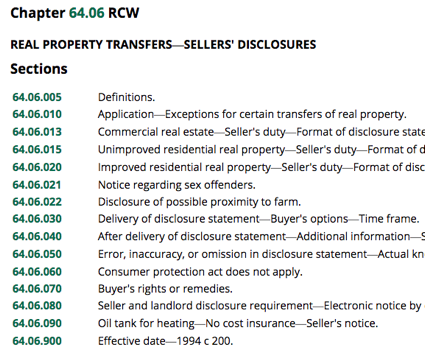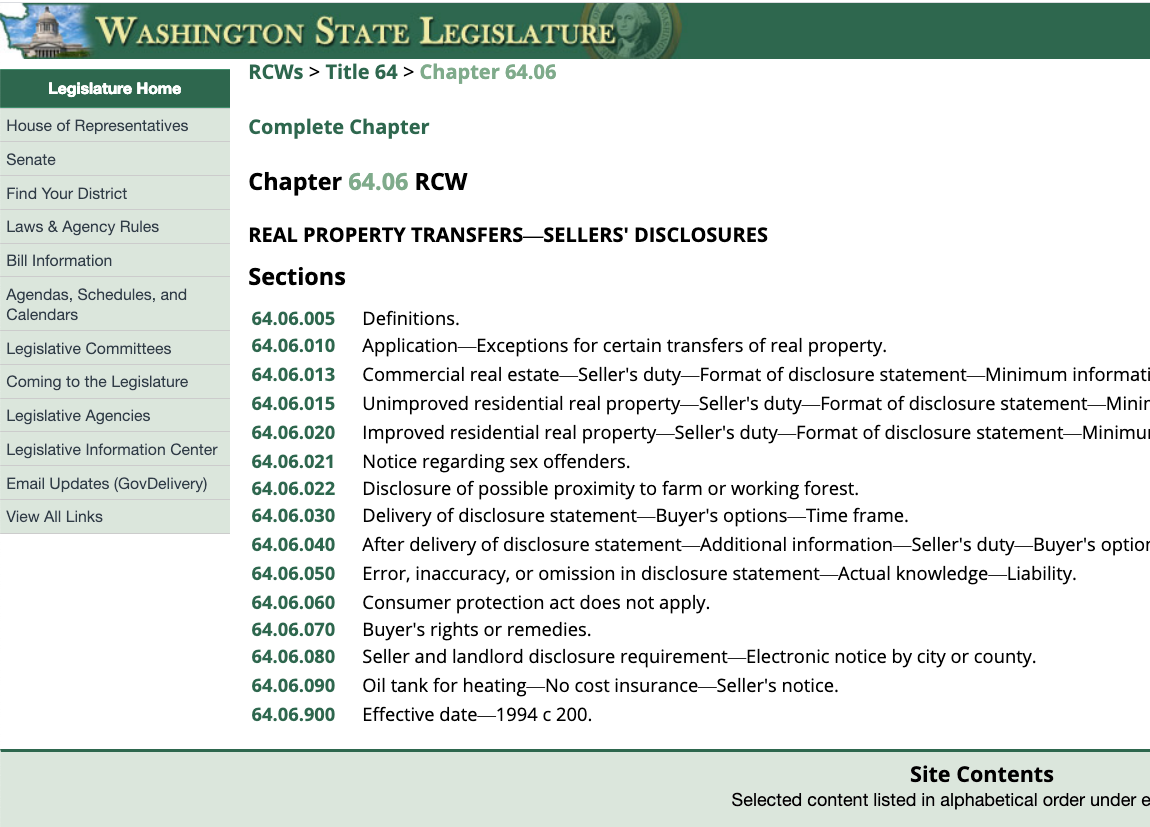The seller disclosure law in Washington has many buyers and sellers confused, but the more surprising story for me is that so many real estate brokers are confused. I’ll focus on the one issue that seems to confuse Realtors more than any other issue in the Form 17 Seller Disclosure Law.
That issue is whether a buyer is obligated under the law to return an acknowledged copy of the Form 17, aka the Seller’s Disclosure Statement, to the seller. Almost every broker I know thinks the buyer must by law acknowledge and return the Form 17 to the listing agent, but that is not true. I’ll explain.
Seller Disclosure Law in Washington

The law requires that the seller provide a Form 17, Seller’s Disclosure Statement to a buyer when they sell a property. But there are two parts of the law in America. The first part of any law is the requirement in the law, the mandatory part, and the second part is the consequences if the mandatory part is not completed. In other words, there is the requirement of the law, and then there is the remedy if the requirement is not fulfilled. We have many laws on the books around America that have virtually no remedy if the law is not obeyed, but we also have many laws with extensive remedies spelled out. Remedies are like punishments, and if the law does not define a remedy, there is no punishment or no consequence.
The Washington Seller Disclosure Law does not punish the seller if he does not provide the buyer with a Form 17, and the Seller Disclosure Law does not punish the buyer if he does not give the seller an acknowledged (signed and dated) Form 17 back.
The law does provide remedies for both parties should the other party not fulfill the requirements of RCW 64.06, and now I’ll tell you what those remedies are.
Seller Disclosure Law Remedies
If the seller does not comply with the law and does not give the buyer a Form 17, the remedy spelled out in the Seller Disclosure Law is that the buyer may terminate the transaction at any time right up to closing. So clearly the seller is motivated to provide the buyer with a Form 17 as early as practical.
If the seller gives the buyer a Form 17 but the buyer does not acknowledge it and return the acknowledged copy to the seller, the seller has remedies under the Seller Disclosure Law. After 3 days of receipt of the Form 17, the buyer can no longer terminate based on the Form 17 or any of the answers the seller provided in the Form 17.
Some listing brokers get all excited and demand an acknowledged copy of the Form 17 from the buyer, but it’s not required by law. There is a remedy for the seller, or you could say the buyer loses certain rights under the law (the right to terminate), but a buyer may not care about the Seller’s Disclosures. The buyer may totally rely on his own home inspection and his own due diligence, and not what the seller “thinks” or “can’t remember” or just “doesn’t know” in the Form 17.
Obviously, a Form 17 should be issued by every seller, and every buyer should read it, but honestly, whether the buyer acknowledges it or not is nearly irrelevant, since he is not going to rely on the seller’s representations, and since he will have his own inspections done, which are far more informative and reliable anyway. If there is something the seller needs to disclose that is a nightmare that would scare the buyer away, the buyer can read that in the Form 17, but more than likely and deal with it. Most likely, the buyer’s own inspectors will find serious problems without the Seller’s Form 17. If there was a serious problem the seller disclosed in the Form 17, the buyer could terminate within 3 days under the law, but again, if there is nothing of concern to the buyer, he doesn’t have to acknowledge or do anything with the Form 17.
This last point is what so many Realtors do not understand. But now you as a buyer of a future Sequim home understand the Washington Seller Disclosure Law on these narrow issues. BTW, if a buyer and seller close a transaction, the requirements and the remedies under the Seller Disclosure Law are all water over the dam, meaning they have all been waived and no longer can be enforced against the other party. So once a buyer closes, the buyer cannot complain about anything in the Form 17, and the buyer also cannot complain about not getting one. Likewise, once a seller closes, the seller cannot complain about not getting an acknowledged copy back from the buyer. At closing, everything merges into the final closing document, i.e. the Statutory Warranty Deed that is recorded.
As a brokerage matter, the brokers representing the buyer and seller want to be sure that they have facilitated the requirements of the law, but as long as they have documented that they provided the seller with a Form 17 and asked them to complete it, sign it and return it, and as long as they give the buyer’s agent a copy of that form, the listing agent has done their job and are not liable if the seller either chooses not to provide one, or the buyer has refused to return an acknowledged copy. Likewise, the buyer’s agent must facilitate the requirements of the law by giving the Form 17 to the buyer and getting their response, if they have one within 3 days, and providing an acknowledged copy to the listing agent. But if the buyer does not acknowledge it, the buyer’s agent has no responsibility or liability.
As a buyer (or a seller), you should not have to know all this, but your buyer’s agent should if he or she is going to do a good job for you, protect you, and cover your backside all the way to closing. I don’t want to start beating the drums about the importance of selecting the right buyer’s agent, but I think you can see how critical it really is. I hope that all this free information and my willingness to share everything I have ever learned in real estate will encourage you to consider hiring me as your buyer’s agent. I am Chuck Marunde, and you can text me anytime at 360-775-5424.
You can learn a lot more about our Seller Disclosure Law in the many other articles on this blog about the law and it’s remedies.
Last Updated on March 11, 2019 by Chuck Marunde






























Answer from Chuck Marunde: Ron, that’s a question that requires a lot of information before a lawyer can answer it. For example, your jurisdiction determines the applicable law, the contract you used and the language used in any addendums determines contract law as applied to your transaction with the seller, and although the Seller’s Disclosure Statement in Washington State is essentially void after closing, it also would be examined for intentional misrepresentation by the sellers. Then you also have examine the relevant facts and testimonies, if any, that would apply to the representations made by the seller, and even by the listing agent, and your knowledge and reliance upon those representations. As you can see, it can be a very involved legal analysis. I can’t do a legal analysis for you here, but you may want to talk to an attorney who actually specializes in real estate as opposed to all the attorneys who have a general practice but always claim they do real estate law. There are too many traps for the unwary out there my friend.
Unpermitted room additions sellers said were permitted and signed off in disclosure form learned four years later when we tried to sell property. Can we sue seller now?